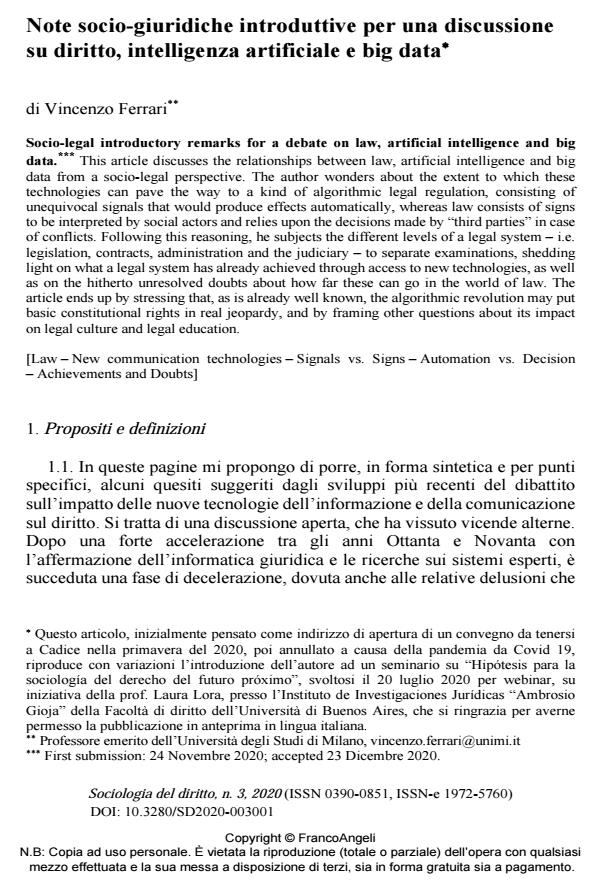Socio-legal introductory remarks for a debate on law, artificial intelligence and big data
Journal title SOCIOLOGIA DEL DIRITTO
Author/s Vincenzo Ferrari
Publishing Year 2021 Issue 2020/3
Language Italian Pages 24 P. 9-32 File size 302 KB
DOI 10.3280/SD2020-003001
DOI is like a bar code for intellectual property: to have more infomation
click here
Below, you can see the article first page
If you want to buy this article in PDF format, you can do it, following the instructions to buy download credits

FrancoAngeli is member of Publishers International Linking Association, Inc (PILA), a not-for-profit association which run the CrossRef service enabling links to and from online scholarly content.
This article discusses the relationships between law, artificial intelligence and big data from a socio-legal perspective. The author wonders about the extent to which these technologies can pave the way to a kind of algorithmic legal regulation, consisting of unequivocal signals that would produce effects automatically, whereas law consists of signs to be interpreted by social actors and relies upon the decisions made by "third parties" in case of conflicts. Following this reasoning, he subjects the different levels of a legal system - i.e. legislation, contracts, administration and the judiciary - to separate examinations, shedding light on what a legal system has already achieved through access to new technologies, as well as on the hitherto unresolved doubts about how far these can go in the world of law. The article ends up by stressing that, as is already well known, the algorithmic revolution may put basic constitutional rights in real jeopardy, and by framing other questions about its impact on legal culture and legal education.
Keywords: Law - New communication technologies - Signals vs. Signs - Automation vs. Decision - Achievements and Doubts
- Generative Artificial Intelligence and Fifth Industrial Revolution Angela Busacca, Melchiorre Alberto Monaca, pp.117 (ISBN:978-3-031-73879-1)
- Algonormative expectations Germano Schwartz, Renata Almeida da Costa , in Oñati Socio-Legal Series /2024
DOI: 10.35295/osls.iisl.1864
Vincenzo Ferrari, Note socio-giuridiche introduttive per una discussione su diritto, intelligenza artificiale e big data in "SOCIOLOGIA DEL DIRITTO " 3/2020, pp 9-32, DOI: 10.3280/SD2020-003001